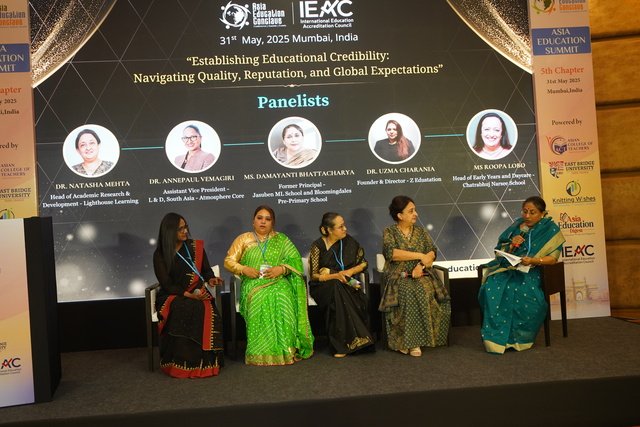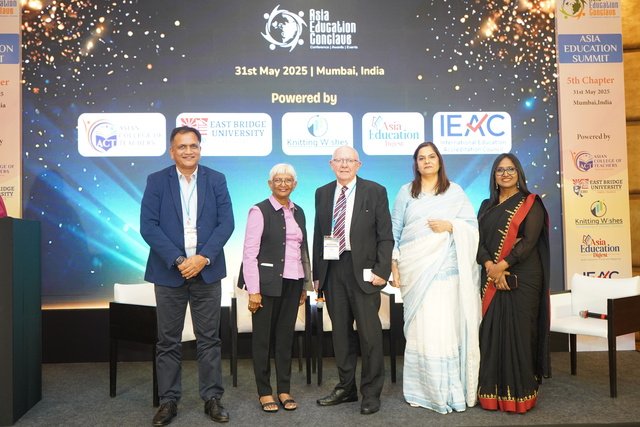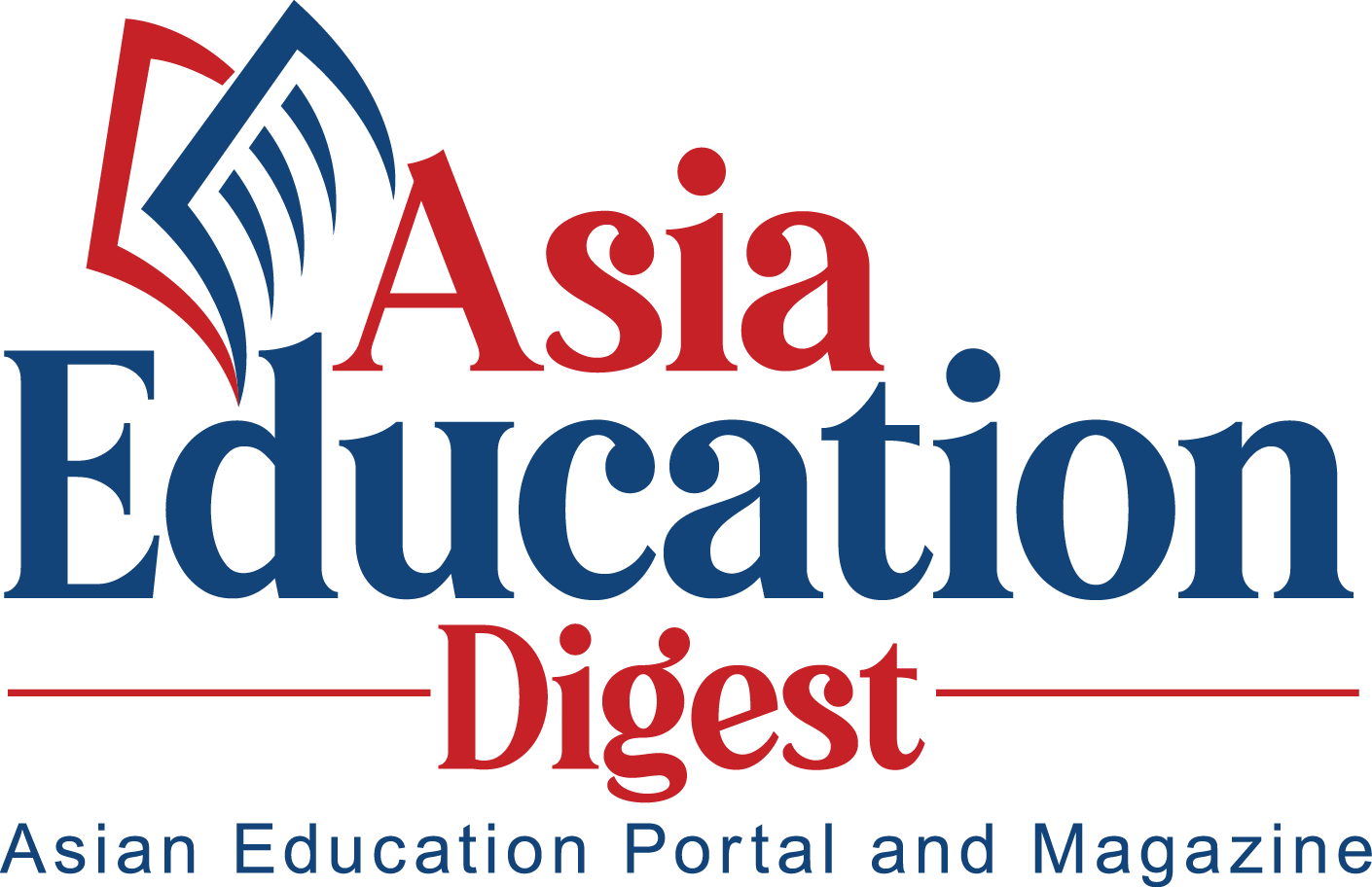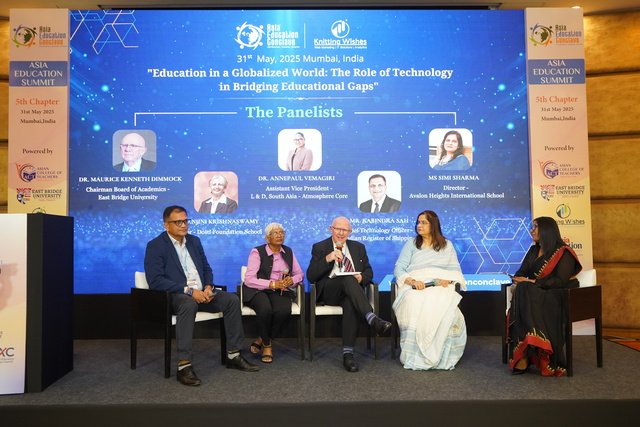At the heart of Asia Education Conclave 2025 lay two transformative segments — the EduTalks and Panel Discussions, designed to provoke thought, spotlight innovation, and ignite dialogue on the evolving future of education.
The EduTalk series served as a powerful stage where distinguished educators shared profound insights, visionary thinking, and practical reflections.
Dr. Ranjini Krishnaswamy, a stalwart in Indian education and Director of Dosti Foundation School, delivered a stirring EduTalk that emphasized the role of values, leadership, and global outlook in education. With decades of service in curriculum building and academic leadership, her address offered deep perspectives on nurturing purpose-driven learning communities. And her words resonated with an audience seeking not just educational excellence, but education with a soul.
This was followed by an equally compelling session by Dr. Natasha Mehta, Head of Academic R&D at Lighthouse Learning. With a portfolio spanning over 50 authored books and decades of experience in K–12 pedagogy, her EduTalk illuminated the power of EdTech, curriculum innovation, and cross-cultural learning ecosystems. She addressed the urgency of preparing students for a future that blends local relevance with global readiness.
Together, the EduTalks underscored a collective commitment to empathetic leadership, continuous innovation, and lifelong learning — the core themes that Asia Education Digest will continue to explore and amplify.
Asia Education Conclave, Mumbai 2025, also hosted two insightful panel discussions, each tackling a defining theme shaping the modern education landscape.

Panel Discussion on Establishing Educational Credibility
In a globalized academic climate, where students and institutions alike pursue excellence and credibility, this panel unpacked what it takes to build trust and recognition in education. Powered by the International Education Accreditation Council (IEAC) and moderated by Ms. Damayanti Bhattacharya, the discussion brought together powerful voices:
Dr. Annepaul Vemagiri – a trailblazer in L&D and professional coaching
Dr. Uzma Charania – a visionary in inclusive education and sustainability
Ms. Roopa Lobo – a pioneer in early childhood education and teacher training
Dr. Natasha Mehta – expert in curriculum leadership across borders
This panel explored how institutions can align with global standards, uphold ethical learning, and build strong academic brands. The role of accreditation, innovation, and pedagogical integrity took center stage, making it a deeply relevant session for school leaders and educators alike. Speaking in the panel, Dr. Vemagiri said, “I come from a place or organization where we educate people on education. It’s a corporate world, where we step in as learning and development professionals who are not invited. Because everybody is in that corporate world of working, here we come in where we want to bring people to learning and keep up the quality.”
Dr. Vemagiri touched upon the crucial factor that’s important for professionals for success and sustainability when she said, “Education is not the priority for organizations (on a major ground). We, learning and development professionals, step in to bring it to the forefront. The first step is definitely to bring it to the forefront and then keep up the quality. So, what we are racing against is the time limit in organizations; we have a very little chunk of time and we have no choice to make any mistakes. What we do is, first of all, we have our standards set and approved.”
When we talk about education, global standards, and academic brands, we cannot help but leave aside pre-school education. Dr. Natasha Mehta elaborated on her experience with parents’ outlook and requirements for preschools. She said, “I think pre-school education has been largely run by the unorganized sectors, and there are some major organized big players in the country. With the release of NEP, that thought changed the process, moved (moving) focus into pre-school education. There’s so much buzz about what NEP is saying on social media and in the newspapers. As a result, parents also have more information, and they started thinking more about what kind of school their two-year-old or four-year-old should go to. One of the things we see is that, because my organization here we run around, we have 60 K-12 schools, which have pre-school components. But we also have 1800 stand-alone pre-schools; there’s a distinct way in which parents, different kinds of parents who come to those different kinds of setups. But one of the major changes I have seen over the last 10 years is that younger people are more looking for neighbourhood schools.”
The discussion brought forward the growing concerns of parents that reflect on what they look for when searching for schools for their wards. Dr. Mehta further clarified, “Parents of two-year-olds or four-year-olds, earlier, would send their child to a 40-minute travel distance, if it was a great school. There is a shift, definitely in that, they want a neighbourhood school, they are so involved in their children's education, and so critical in the way they analyze schools. They want to look at what curriculum is being used, where the teachers are coming from, they ask for qualifications of the teachers, and they look at spaces. Specifically in pre-schools, the priority is safety; is my child happy going to school, is he or she comfortable around the teachers, and how close is the school to my home so that the child won’t have to travel too much.”
Teachers and trainers are the boatswains in an education fraternity; they ensure quality. Ms. Roopa Lobo stressed the importance of continuous learning for teachers and trainers. She said, “As a trainer, I feel it is very important for a teacher to unlearn to relearn. If a teacher is a lifelong learner, she keeps evolving.”
Panel Discussion on Education in a Globalized World
In a world where connectivity defines access, this panel brought together academic and tech leaders to discuss how technology is enabling equity, personalization, and scalability in learning.
Moderated by Dr. Annepaul Vemagiri and powered by Knitting Wishes, the panel featured:
Mr. Rabindra Sah – CTO of Indian Register of Shipping, leading digital education advocacy across India’s top institutes
Dr. Ranjini Krishnaswamy – speaking on inclusive strategies and school transformation
Ms. Simi Sharma – known for implementing silent teaching and mindful pedagogy
Dr. Maurice Dimmock – global voice in transnational education and accreditation
This forward-looking session talked on ‘the role of technology in bridging educational gaps.’ The panel explored how AI, digital platforms, and cross-border collaboration can democratize learning, especially in underserved and remote contexts. The message was clear: technology is not just a medium—it is a movement.
These sessions at AEC 2025 exemplified Asia Education Digest’s mission — to elevate voices that are shaping the future of education through dialogue, leadership, and innovation.
Dr. Annepaul Vemagiri, “What measures we do is, first of all, we have our standards created; approved. We do not conduct any sessions which are out of the standards; so, standards are set, approved by the organisation as per the core purpose and values. Then we invite external quality assurance auditors, and they audit our standards, physically. In our hotels, that is a general practice that twice in year, a mystery shopper comes in, does the quality audit (and we don’t know who the mystery shopper is going to be); does the entire quality audit of our standards, including the emotional quotient of the people; the soft skill as well and then from there we get the ‘gap’.”

EduTalks: Power Talks on the Conclave Stage
The guests witnessed thought-provoking discussions; the speakers talked about the future of learning from a wholesome perspective, which factors will influence them, and what to expect in the years to come.
Dr. Natasha Mehta, an academic visionary with over 30 years of experience in education, curriculum design, leadership, and instructional innovation. She is the Head of Academic Research and Development at Lighthouse Learning, who addressed one of the most talked-about matters in the aspiring professionals' circle and among practicing professionals as well. Dr Mehta elaborately talked about the most-demanded skills across the world, the growing demand for problem-solving skills, and how AI is intensifying its impact on jobs across industries. She spoke at length about children's mental health and how modifying the purpose of learning can help children grow up as adaptive and resilient professionals with undeterred grit.
Simi Sharma – one of the guests of honor, is a distinguished educator and the visionary founder of Avalon Heights International School and Blooming Buds. With over two decades of impactful leadership in education, she has championed innovative practices like ‘silent teaching,’ integrated curricula, and mindfulness in the classroom, shaping Avalon Heights into one of Navi Mumbai’s most respected institutions. Ms. Sharma expressed her profound appreciation for the students who attended the convocation; her words were profoundly encouraging and something that highly inspired the students.
Dr. Ranjini Krishnaswami is an exemplary educational leader, Director of Dosti Foundation School, who shared her personal experiences of being an educational leader and a school director. As the venue brought together students for their convocation, educationists, leaders, and the changemakers, Dr. Krishnaswami’s wisdom and highly engaging EduTalk left a lasting impression on the audience.
The EduTalks and panel discussions at the Asia Education Conclave 2025 in Mumbai sparked powerful conversations that transcended traditional boundaries of education. From redefining early childhood learning to embracing AI and global standards, each voice echoed a shared commitment to purpose-driven education. These sessions didn’t just inform—they inspired. They challenged educators to rethink, reimagine, and relentlessly pursue quality, equity, and innovation. As the world of learning evolves, the conclave stood as a reminder: it’s not just about keeping, it’s about boldly leading the way forward.


